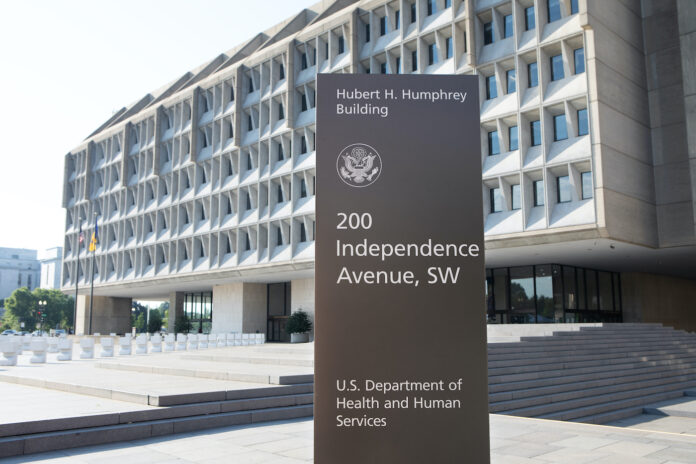WASHINGTON – The U.S. Department of Health and Human Services (HHS) has recommended reclassifying cannabis from Schedule I to a less restrictive Schedule III under the Controlled Substances Act, following President Biden’s request last year for the Department of Justice (DOJ) and HHS to “expeditiously” reconsider the plant’s classification.
In a letter dated Aug. 29, HHS Assistant Secretary for Health Rachel Levine submitted the department’s rescheduling recommendation to Drug Enforcement Administration (DEA) Administrator Anne Milgram, according to Bloomberg News. A DEA spokesperson confirmed the department received the letter and will initiate a review. After the review is complete, the nation’s top drug enforcement agency will forward its recommendation to U.S. Attorney General Merrick Garland for action.
On Wednesday, White House Press Secretary Karine Jean-Pierre said the DOJ and HHS were working through an independent process guided by evidence.
“We’re going to let that process move forward,” said Jean-Pierre.
While there’s no formal timeline for the DEA’s review, a former FDA official believes rescheduling likely will take place during the current presidential term, which ends January 20, 2025. He does not, however, expect cannabis to be removed from the Controlled Substances Act.
“If I were a betting man, I think the most likely outcome will be Schedule III,” Howard Sklamberg, an attorney who held a variety of oversight roles at the FDA from 2010-2017, said during a Mindset Capital podcast last week. “To deschedule, it [the FDA] would basically have to say that there’s no abuse potential, and for a host of reasons, it’s just extremely unlikely to do that. I think Schedule II is also a possible outcome. If I had to rank the outcomes, I would say Schedule III is the most likely, Schedule II is the second most likely, and then the probabilities get much smaller after that.”
Schedule III drugs, which include anabolic steroids, testosterone, and ketamine, may be abused but are commonly prescribed medications. Schedule I is the most restrictive classification, containing drugs like cannabis, heroin, PCP, and crack cocaine. They carry a high risk of abuse and are not considered safe for medical use.
Moving cannabis from Schedule I to Schedule III would have a significant impact on the way the substance is treated under law and in commerce. In addition, Internal Revenue Code Section 280E no longer would bedevil the industry, as cannabis would no longer be a strictly prohibited substance.
“This action has the potential to significantly transform the landscape for all legal operators across the country,” said Matt Hawkins, founder and managing partner at Entourage Effect Capital. “The HHS recommendation to reclassify cannabis under Schedule III would remove the 280E tax burden, which currently prohibits businesses from deducting necessary business expenses on their federal tax returns.”
Nevertheless, not everyone is entirely satisfied with the potential shift.
“Moving cannabis to Schedule III could have some limited benefit but does nothing to align federal law with the thirty-eight U.S. states which have already effectively regulated cannabis for medical or adult use,” National Cannabis Industry Association Chief Executive Officer Aaron Smith said. “The only way to fully resolve the myriad of issues stemming from the federal conflict with state law is to remove cannabis from the Controlled Substances Act and regulate the product in a manner similar to alcohol.”
The stock markets, on the other hand, seemed ecstatic about the news. Shares of publicly traded cannabis companies including Columbia Care Inc., Green Thumb Industries Inc., Verano Holdings Corp., Ayr Wellness Inc., and Cresco Labs Inc. soared by as much as 29 percent after the news broke Wednesday afternoon. The BI Global Cannabis Competitive Peers Index, a list of fifty-four industry stocks, was up 11 percent.
“This is a historic day, and we are cautiously optimistic for the changes this will bring to the legal cannabis industry and legalization movement,” said Poseidon Garden Ventures Managing Director Patrick Rea. “Certainly moving cannabis off Schedule I is the right decision and long overdue… With cannabis moving to Schedule III, the industry expects IRS Code 280E to no longer apply to marijuana businesses, resulting in much lower effective tax rates for businesses across the industry.”
What is a Schedule III controlled substance?
According to the DEA’s Researcher’s Manual, “Substances in this schedule [III] have a potential for abuse less than substances in Schedules I or II, have a currently accepted medical use in treatment in the United States, and abuse may lead to moderate or low physical dependence or high psychological dependence.” Examples of Schedule III substances include anabolic steroids, testosterone, ketamine, products containing moderate levels of morphine and codeine, and some products used to treat opiate addiction.











[…] This week alone, GOP-led House committees rejected three cannabis-friendly amendments to budget bills and added language that would block the Department of Justice (DOJ) from rescheduling cannabis as recommended by U.S. health officials. […]
[…] has pledged to file legal challenges if cannabis is moved any lower than Schedule II under the CSA. HHS recommended Schedule III, which would present the industry with financial and other potential benefits. Cannabis currently […]
[…] has pledged to file legal challenges if cannabis is moved any lower than Schedule II under the CSA. HHS recommended Schedule III, which would present the industry with financial and potentially other benefits. Cannabis currently […]
[…] since August 2023, when the Department of Health and Human Services (HHS) recommended moving marijuana to a less-restrictive schedule under the federal Controlled Substances Act (CSA), the industry has […]
[…] The DEA has not confirmed the decision, but reclassification would cap a process that began more than a year ago when President Joe Biden tasked the departments of Justice and Health and Human Services with reevaluating cannabis’s legal status. […]
[…] According to Whitney Economics founder Beau Whitney, past-due receivables are an existential threat to the U.S. industry, and creating a sustainable economic model will require change at the regulatory level. […]
[…] hopeful,” said Liesl Bernard, chief executive officer at CannabizTeam. “With the expected reclassification of cannabis from Schedule I to III, slow but steady East Coast expansion, and the rise of cannabis acceptance, […]
[…] a recheduling review requested by President Joe Biden last year, the U.S. Department of Health and Human Services (HHS) determined cannabis has currently […]
[…] crux of the matter lies in the federal classification of cannabis as a Schedule I substance under the Controlled Substances Act. Despite individual states legalizing the plant in various […]
[…] yet, rescheduling marijuana to Schedule III, the outcome that is anticipated to result from the Biden Administration’s actions, would continue the very criminalization Biden said he would end and is the very type of […]
[…] Summit, where she reaffirmed her opposition to the Drug Enforcement Agency (DEA) potentially moving cannabis from Schedule I to Schedule III under the Controlled Substances Act—a change Lee “assumes” will happen at the end of the […]
[…] and predicted an outcome for cannabis by July 2, 2024, exactly 308 days from a rescheduling recommendation HSS sent to the DEA. Under this timeline, the DEA’s proposed ruling and public comment period would commence before […]
[…] chief Anne Milgram in 2024, with the industry hoping for a watershed year of rescheduling and the elimination of Internal Revenue Code Section 280E. But even if the pessimistic view prevails and there’s no substantive policy change over the next […]
[…] Drug Enforcement Administration confirmed it is reviewing a recommendation that cannabis be moved from Schedule I to Schedule III under the Controlled Substances […]
[…] industry experienced an exciting end to 2023. First, the Department of Health and Human Services filed a recommendation with the Drug Enforcement Administration to request cannabis be reclassified as a Schedule III […]
[…] altogether, the move is a solid indicator the industry is moving in a positive direction. With the change from Schedule I to Schedule III, which may be approved as early as mid-year, we will see monumental shifts in taxes as cannabis […]
[…] the agency recommended the Drug Enforcement Administration reschedule the plant and its products as Schedule III controlled substances. If the DEA acts on this recommendation, it would have a major impact on the bottom line of every […]
[…] Health and Human Services and the Department of Justice conduct a review of the current scheduling, HHS recommended reclassifying marijuana to Schedule III, where sale and use would be somewhat less restricted and state-legal businesses could reap some […]
[…] that keep investors at bay. But 2023 could be the spark that ignites real change if cannabis is reclassified from Schedule I to a less restrictive Schedule III under the Controlled Substances Act […]
[…] the industry gears up for another concerted push for federal rescheduling, the clear-eyed and research-backed findings of scientists will play a crucial role. Naysayers […]
[…] news, people have questions, and cannabis stocks will go crazy,” Gilliam noted. “[In September] the idea of rescheduling cannabis came up and the entire industry went a little crazy because nobody fully understood what the implications […]
[…] being said, the combination of uplisting and the recent rescheduling news increased our trading volume by more than 400 percent with bid-ask spreads narrowing. We also have […]
[…] chartered financial analyst and the director of data analytics at Viridian Capital Advisors. “The potential rescheduling to [Schedule III] will have strong positive impacts on capital raising and [mergers and […]
[…] and Human Services (HHS) Assistant Secretary for Health Rachel Levine submitted the department’s rescheduling recommendation to Drug Enforcement Administration Administrator Anne Milgram. HHS recommended cannabis be moved […]
[…] sprung from the Department of Health and Human Services’ August 30 recommendation that the DEA reschedule cannabis, igniting some hope that our latest bear run is behind […]
[…] U.S. Health Officials Recommend Schedule III for Cannabis […]
[…] U.S. Health Officials Recommend Schedule III for Cannabis […]
[…] U.S. Health Officials Recommend Schedule III for Cannabis […]
[…] U.S. Health Officials Recommend Schedule III for Cannabis […]